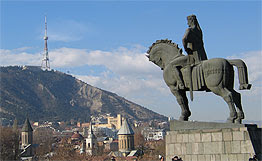 Tensions have drastically escalated in the breakaway republic of Abkhazia since last Thursday. A group of Abkhazian saboteurs penetrated the Georgian controlled territory near the Upper Kodori Gorge (Upper Abkhazia) and attacked workers who were building a road connecting the gorge with Svaneti. The terrorist group opened fire on the forces of the Georgian Interior Ministry who were guarding the road construction. Georgian security responded to the attackers with fire-- killing two Abkhazian intruders, wounding four, and capturing six.
Tensions have drastically escalated in the breakaway republic of Abkhazia since last Thursday. A group of Abkhazian saboteurs penetrated the Georgian controlled territory near the Upper Kodori Gorge (Upper Abkhazia) and attacked workers who were building a road connecting the gorge with Svaneti. The terrorist group opened fire on the forces of the Georgian Interior Ministry who were guarding the road construction. Georgian security responded to the attackers with fire-- killing two Abkhazian intruders, wounding four, and capturing six."An illegally armed unit, controlled by Abkhazian authorities, entered the territory controlled by Georgia-- which in fact controls the road which connects the upper Abkhazian Kodori Gorge with the rest of Georgia. The clear objective of that unit was to take control of that part of road and to attack," said David Bakradze, Georgian Minister on Conflict Resolution Issues. [More]









